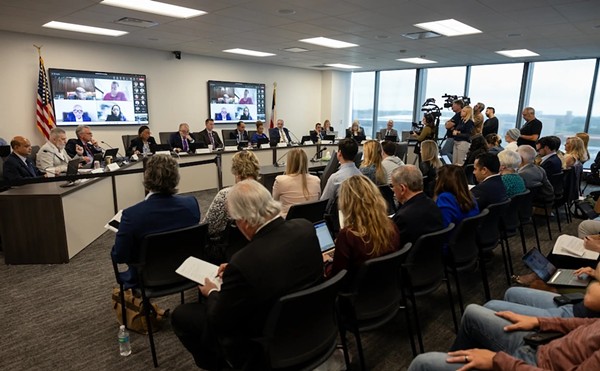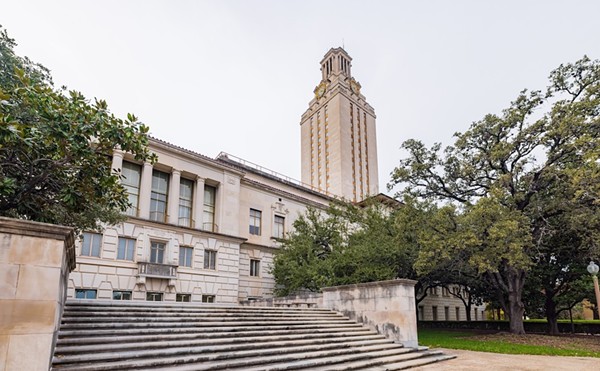|
By Lisa Sorg For the watchdogs of the Texas Commission on Environmental Quality, the title of the conference sounded oxymoronic: "The State of Environmental Enforcement in Texas." And according to a December 2003 state auditor's report on the TCEQ's enforcement record, those watchdogs are right. The pointed and often damning 51-page report underscored critics' persistent complaints that the TCEQ's impotency harms average citizens. The TCEQ has since launched an overhaul of its enforcement division. The report prompted Texas Impact and the Texas Public Interest Group to hold the April 16 conference where district attorneys, environmental lawyers, the public, and TCEQ officials could address issues endemic in the TCEQ's enforcement division: lack of enforcement, substandard monitoring, and disheveled or missing data. "We have the best environmental laws on the planet," said keynote speaker Eric Schaeffer, former EPA director of the Office of Regulatory Enforcement. He resigned in February 2002, frustrated by the Bush Administration's handling of the environmental issues. "They've been challenged in the courts and attacked in the legislature, but they've stood the test of time. But they're meaningless unless they're enforced." According to the state auditor, from fiscal year 2001-2003, the TCEQ collected an average of just 20 cents on the dollar in penalties from polluters. Sluggish enforcement allows violators to continue polluting - and profiting - while costing the state general fund and the TCEQ millions of dollars in lost revenue. From 2001-2003, the TCEQ didn't mail 45 percent of its enforcement orders on time, allowing violators to reap economic benefits of $720,253. Of the 80 environmental enforcement cases examined by the auditor's office, violators benefited by $8.6 million during the time they were breaking the law. The TCEQ fined them $1.68 million. Many of the TCEQ's monitoring reports are spotty or based on faulty data, which prevents investigators and the public from knowing the true extent of contamination. The report also criticized the TCEQ's policy on field notes, which required that they be destroyed after 60 days. "Destroying these notes and check lists prevents the Commission and outside reviewers from verifying the accuracy of inspection reports and the reliablity of data," the report stated. The TCEQ changed its policy on January 30, and now retains its field notes.
John Rumpler, senior environmental attorney for the National Association of State Public Interest Groups, emphasized that the public must be involved in the permitting and enforcement process. "Every new and re-permitting facility should accept as a privilege, citzens at the table," Rumpler said. "They need to work out issues before a public hearing. Otherwise the hearing is just an exercise in venting." The report criticized the TCEQ for failing to actively promote public participation in permitting and for its poor file management. For instance, at the TCEQ's Austin headquarters, many of CPS' compliance records were missing, and the file system is generally disheveled. The TCEQ also lacks funding to investigate polluters, particularly in the commission's criminal division. In contrast, in 2003, district attorneys in Harris County, one of the state's most polluted areas, handled 605 criminal environmental cases, which deal with the most egregious polluters; the TCEQ investigated 12 statewide. Harris County has 12 investigators in its environmental crimes; the TCEQ has nine for the entire state. Like most Texas counties, Bexar County has no criminal environmental investigators, although former Assistant District Attorney Michael Schill worked on environmental issues until his retirement. An interim joint legislative committee has been appointed to examine the TCEQ's policies, including funding issues. Meanwhile, the TCEQ is holding monthly work sessions to revamp its enforcement division. After watching the TCEQ take a beating from critics for most of the conference John Steib, deputy director of Office of Compliance and Enforcement tried to assure attendees that the commission is taking seriously the auditor's report: "We're committed to improving enforcement in Texas. We're not going to be doing it the same way it has always been done. This is a big deal for us." The TCEQ plans to post a summary of key enforcement issues on its website from April 27-May 28. Go to www.tceq.state.tx.usabout/organization/oce.html. • As the Current was going to press on April 20, the TCEQ announced that Executive Director Margaret Hoffman resigned.
|



















